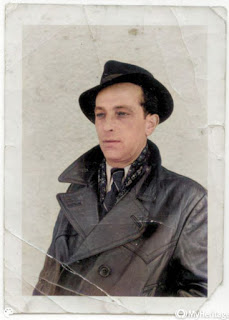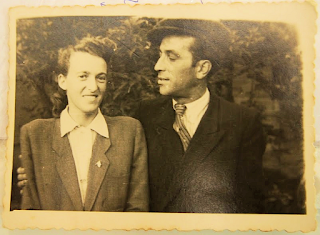
Arnold Roth tweeted this yesterday as we marked 72 years of Israel’s proudly-restored independence.
Text:
From Jerusalem on #IsraelIndependenceDay, my family gives thanks for the WW2 Alled victory and the liberation by US forces of Dachau-Kaufering, a Nazi German death camp from where my father Abraham Rottenberg, a slave laborer, emerged among the few survivors 75 years ago today. pic.twitter.com/gbB3bHx6Ie— Arnold Roth (@arnoldroth) April 29, 2020
And then this:
As with many Holocaust survivors, the joy concealed the background darkness. Dad died in 1982. In 2000, I learned for the first time of his first wife, murdered by the Nazi Germans. And in 2016, I learned about their daughter, murdered at age 3. Of these losses, he never spoke.— Arnold Roth (@arnoldroth) April 29, 2020
Arnold’s father of blessed memory, Avraham Zvi-Hersh (Romek to his friends) Rottenberg, was liberated exactly 75 years ago – on April 29, 1945. He and his wife changed the family name to Roth in the 1950s on the advice of friends in Australia, where by then they had made their home, who said a shorter, more ordinary name would help in the process of settling into a new country.
Back to the war. In the summer of 1944, after five years of already living through horrors that in every sense of the word are unimaginable, he was shipped (we now know on the basis of post-war German documentation) to one of the sub-camp complexes of Dachau called Kaufering [background]. There he was a forced-labor prisoner. From an online record [here], we think he may have been working for the Messerschmidt aviation company.
What happened there is, in key respects, nightmarish even by comparison with the rest of the Nazi German genocide industry. As Arnold wrote to our family yesterday:
Dad’s own expriences in the Krakow Ghetto (with his wife Anda and daughter Sara – both soon murdered by the Germans), in the Plaszow labor camp, in the Auschwitz extermination camp and in the Sachsenhausen concentration camp – he was in all of those. US forces took control of what was left of it on April 29, 1945 and Dad then moved to nearby Munich where he soon met Mum.
With the war over and the mad scramble to find family and learn what had happened to them, he became aware (he was one of 17 children) that both his parents and all but one of his siblings along with most of his pre-war fellow-yeshiva-students and friends had been murdered in the Nazi German death machine.
In pst-war Germany, starting, as so many European Jews did in those immediate post-liberation months did, as a penniless, stateless, lone survivor bereft of parents, Romek leveraged his skills as a photographer to quickly get back to making a living. He remained in that line of work until the late 1960s.
In the family lore, based on snatches of recollections he shared with us, he set himself up in one of Munich’s public parks, snapping photographs of people out for a stroll or just enjoying life after a devastating war. He then somehow managed to track down the people he photographed (printing photographs in those days involved chemicals, equipment and considerable time) and sold them, or some of them at least, the photos.
This is how he met and then married Gucia.
Gucia had survived with all three of her sisters by staying together – as they survived the nightmarish experiences of incarcerationn in the Lodz Ghetto, and then Auschwitz and forced labor camp – from the first day of the war until liberation. The four sisters lost her parents and all three of their brothers. Also: their health, their education, their youth.
Arnold shared several photos yesterday – among them these two below – with our family in Melbourne as well as with our childen and grandchildren. He did it to honour, as he wrote, how they rebuilt their lives, soon married (there was a rush of Jewish weddings in post-war Germany), started a family (they unfortunately lost a first child), sailed off to distant Australia, and over the following years raised their two sons in what he describes as comfort and an atmosphere of love and mutual caring.
 |
| Romek in Munich – some time between 1946 and 1949 |
 |
| Romek and his wife Gucia probably photographed just before they married in Munich in November 1947 |
Like many other survivors of the Holocaust, Romek spoke little about his experiences with his own children. And when he did it was usually in the relaxed company of other Yiddish-speaking survivors who needed little background and no explanation from one another in order to put things into context. It was, after all, the context of their lives too.
In particular, to us children, he never once mentioned that he had had and had lost (to murder at the hands of the Nazi Germans) a young wife and a daughter who cannot have been more than three or four when she too was murdered. About these losses and lives we learned only many years after Romek himself passed away.
We have also discovered a whole hitherto-missing branch of his family, the children of an older brother who himself lived through the Holocaust. That family not only survived the war in Europe (as Rottenbergs) but remained there, living until today in Belgium. It’s quite a narrative, one we’re still exploring.
Melbourne’s Jewish community was shaped and hugely influenced by the influx of survivors after its immigration policy was belatedly liberalized starting in 1947.
The Roths arrived in Melbourne as refugees in September 1949. Romek passed away in 1982, Gucia in 2016. May their memories continue, as they have been until now, to be a blessing for their children and theirs.

Leave a Reply